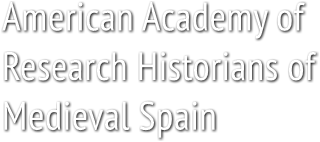CFP: Kalamazoo 2020
The Sneak Preview of the Kalamazoo CFPs has already come out, so it's time to start organizing panels for AARHMS's 2020 ICMS programming!
Bridging the Divide: Jews, Christians, and Muslims in Medieval Iberian Studies
Scholarship on medieval Muslims, Christians, and Jews in the Iberian Peninsula intersects far less often than it should. Particularly conspicuous is the disciplinary divide between the study of Jewish and Muslim communities and cultures, on the one hand, and Christian communities and cultures, on the other, in medieval Iberia. Scholars in different sub-fields often work on similar topics, but do not always engage in a conversation with each other. This session aims to bring together scholars interested in bridging this disciplinary gap. We welcome topics of common interest to Iberianists, including (but not limited to) law and legal discourse; development of state and bureaucracy in Muslim and Christian kingdoms; empire and imperial ideology in Al-Andalus and Christian Iberia; ideas of jihad, crusade, and martyrdom; shared visual and literary cultures between the three faiths; women and gender roles in different religious groups; conversions to another faith; and piety and charity among Iberian Muslims, Jews, and Christians.
Race Before Raza in Medieval Iberian Studies I-II
(co-sponsored with TEMA)
Modern assumptions about race and identity have shaped scholarship on the Middle Ages since such work began. Few fields of study make this more evident than medieval Iberia, where centuries of interaction among diverse ethnic, religious, and cultural communities offer up a canvas for the projection of modern paradigms and ideologies. Although such models can provide a fresh lens through which to consider problems obscured by time and cultural distance, when employed carelessly or unconsciously they can badly distort our image of the medieval Iberian past. Our interdisciplinary sessions invites papers exploring how post-medieval discourse about race and identity has intersected—or could intersect—with modern understanding of the history and culture of the medieval Iberian peninsula. Submissions might consider the efficacy of applying modern concepts and terms to the study of medieval problems; the impact of unconscious or unspoken bias in evaluating medieval evidence; promising methodological strategies in study of the past; and the uses and misuses of medieval Iberian history in modern public and political discourse on race and identity. Both illustrative case studies and scholarly position papers will be considered.
Bishops at the Borders
(co-sponsored with Episcopus)
A recent book review in Speculum noted that it was cool to study bishops again, and the importance of Medieval Iberia as a culturally-diverse space has commanded considerable attention in scholarly and public discussions. The intersection of these two recent scholarly trends presents an obvious and attractive overlap between the fields, creating lasting connections and conversations between both organizations’ interest groups. The differences between the kingdoms in Iberia, the subject of AARHMS scholarship, provide both similarity and contrast between the source bases while the focus of Episcopus on the role of bishops and the secular clergy provides a wider conversation in which Iberianists can participate.
Interested persons should contact the Conference Organizer.
